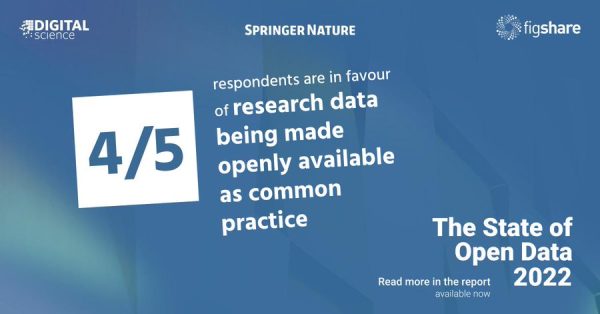Last week saw the publication of the long-awaited report on The State of Open Data 2022 – an annual collaborative effort between Digital Science, Springer Nature and our sister company Figshare.
Globally, the past decade has seen a move from 70% of all publishing being closed access to 54% being open access. In recent years, the COVID-19 pandemic has changed science publishing and necessitated a huge acceleration in transitioning to Open Access (OA) models, driven by a need for speed in publishing and an accompanying growth in preprints.
The State of Open Data report sheds light into researchers’ attitudes towards and experiences of open data; including what motivates them to share their data, challenges or barriers experienced in making data available, and the perceived credibility of data shared openly.

Based on the findings of a global survey, the report has monitored the levels of data sharing and usage since 2016. With more than 5,400 respondents, the 2022 survey is the largest since the COVID-19 pandemic began.
Founder and CEO of Figshare Mark Hahnel says: “This year’s State of Open Data Report comes at a unique point in time when we’re seeing a growing number of open data mandates from funding organizations and policymakers, most notably the NIH and OSTP in the United States, but also recently from the National Health and Medical Research Council (NHMRC) in Australia, and in Europe and the UK.”
In a new Symplectic blog post as part of OA Week, we overview the changing landscape of Open Access, and compare requirements across global mandates.
Institutions and libraries have a particularly essential role to play in meeting new top-down initiatives, not only by providing sufficient infrastructure but also support, training and guidance for researchers. According to the report, “72% of researchers indicated they would rely on an internal resource (either colleagues, libraries or Research Office) were they to require help with managing or making their data openly available.”
“As new data policies continue to be introduced and evolve, such as the OSTP memo in the United States, there remains a collective responsibility for research management professionals to support researchers asked to comply with top-down initiatives and mandates” said CEO of Symplectic Jonathan Breeze. “This not only means ensuring the process of open data deposit is achievable from a technical perspective, but also that guidance is in place to help researchers carry out these processes correctly and as frictionlessly as possible within their day-to-day workflows.”
Within Symplectic Elements, we aim to make the process of depositing publications and data to open repositories such as Figshare as painless as possible. Not only can deposit be carried out directly from Elements with a couple of clicks; the system also lets administrators embed guidance for researchers at each step of the process, helps identify outputs that should be made openly available but has not been, and – where necessary – allows administrators to take actions on a researcher’s behalf to deposit works.
Other primary findings from this year’s report indicated that:
- There is a growing trend of researchers being in favour of data being made openly available as common practice (4 out of every five researchers were in agreement with this), supported somewhat by now over 70% of respondents being required to follow a policy on data sharing.
- However, researchers still cite a key need in helping them to share their data as being more training or information on policies for access, sharing and reuse (55%) as well as long-term storage and data management strategies (52%).
- Credit and recognition were once again a key theme for researchers in sharing their data. Of those who had previously shared data, 66% had received some form of recognition for their efforts – most commonly via full citation in another article (41%) followed by co-authorship on a paper that had used the data.
- Researchers are more inclined to share their research data where it can have an impact on citations (67%) and the visibility of their research (61%), rather than being motivated by public benefit or journal/publisher mandate (both 56%).
“What is clear from the findings of our report is that while most researchers embrace the concepts of open data and open science, they also have some reasonable misgivings about how open data policies and practices impact on them,” concluded Hahnel, “In an environment where open data mandates are increasing, funding organizations would benefit from working even more closely with researchers and providing them with additional support to help smooth the transition to a fully open data future.”
Powering Open Access Workflows with Elements + Figshare – Download PDF >